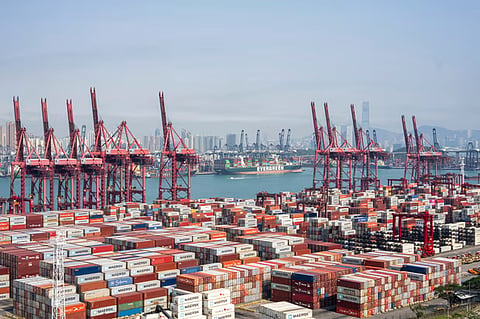

Donald Trump is set to ignite a global trade conflict on Wednesday, forging ahead with a broad array of tariffs targeting America’s main commercial partners, despite warnings of severe economic fallout and widespread appeals to reconsider.
Trump claimed that “many” nations were eager to reach agreements with Washington, as his administration readied itself to slap heavy duties on imports from numerous countries starting Wednesday.
China responded defiantly, pledging to “fight to the end” if Washington follows through with its plan to impose an additional 50% tariff on Chinese goods in retaliation for Beijing’s intended countermeasures against an earlier proposed 34% duty. When combined with an existing 20% charge, the full tariff burden on Chinese imports could soar to 104%.
The White House confirmed that the elevated duties on Chinese goods would take effect as planned. “President Trump has a spine of steel and he will not break,” said press secretary Karoline Leavitt. “And America will not break under his leadership.”
Elon Musk, the billionaire adviser to Trump, has reportedly urged the president to halt the tariff surge.
These newly announced tariffs surpass the across-the-board 10% rate introduced the previous Friday. Unlike that flat tax, the latest duties vary by country, using a formula that has drawn criticism from economists. The calculation divides the bilateral goods trade deficit by twice the total value of imports, raising concerns about its fairness and transparency.
Markets initially found some relief on Tuesday, recovering modestly after days of turbulence following the initial announcement. US officials attempted to soothe investors, suggesting that the tariffs—such as 20% on European Union goods, 26% on Indian imports, and 49% on products from Cambodia—might not be long-lasting.
However, the optimism faded quickly. On Wall Street, the S&P 500 closed 1.6% lower at 4,982.77, dipping below the 5,000 mark for the first time in over a year. The Dow Jones industrial average slid by 0.8%, and the tech-heavy Nasdaq Composite dropped by 2.2%.
Elsewhere, the FTSE 100 in London gained 2.7%, clawing back some of the ground lost since the US announcement. In Asia, Tokyo’s Nikkei 225 surged by 6%, while Hong Kong’s Hang Seng Index rose by 1.5%.
US treasury secretary Scott Bessent insisted that the new tariff rates represent the administration’s ceiling and suggested they were designed to bring nations to the negotiating table. “I think you are going to see some very large countries with large trade deficits [with the US] come forward very quickly; if they come to the table with solid proposals, I think we can end up with some good deals,” he said.
Questioned on Monday about whether the measures were a prelude to negotiations or meant to be enduring, Trump replied, “Well, it can both be true. There can be permanent tariffs, and there can also be negotiations.”
On Tuesday, he hinted again at potential bilateral deals, noting progress with Seoul. “Their top team is on a plane heading to the US, and things are looking good,” he wrote on his Truth Social platform. “We are likewise dealing with many other countries, all of whom want to make a deal with the United States.”
He continued: "One-stop shopping is a beautiful and efficient process. China also wants to make a deal, badly, but they don’t know how to get it started. We are waiting for their call. It will happen.'
China, meanwhile, adopted a sharply critical tone. In a blistering editorial, the state-run news agency Xinhua accused Trump of “naked extortion”.
“Utterly absurd is the underlying logic of the United States: ‘I can hit you at my will, and you must not respond. Instead, you must surrender unconditionally,’” the piece stated. “This is not diplomacy. It is blunt coercion dressed up as policy.”
On Chinese social media, a 1987 clip of Ronald Reagan resurfaced, in which the late US president denounces tariffs as a path to retaliation and economic self-harm. According to The Paper, a Chinese publication, the remarks “have a new meaning in 2025”.
US treasury secretary Bessent warned China against retaliating, calling it a strategic error. “They’re playing with a pair of twos,” he said on CNBC. “What do we lose by the Chinese raising tariffs on us? We export one-fifth to them of what they export to us, so that is a losing hand for them.”